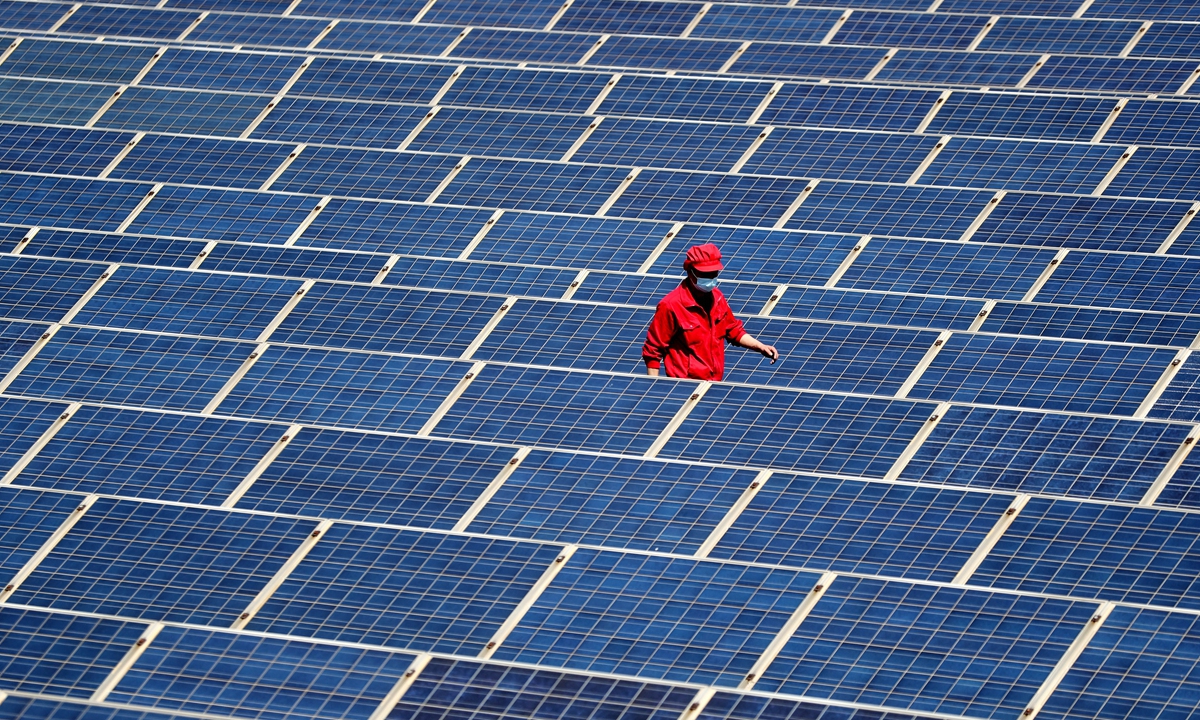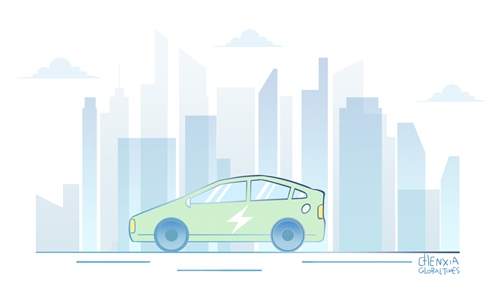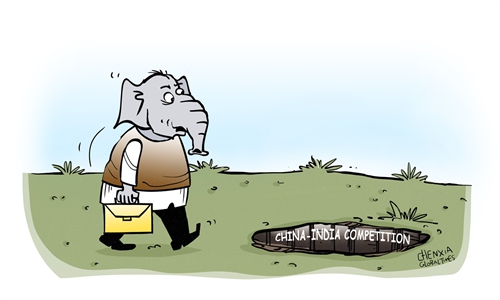

A technician inspects the rooftop photovoltaic (PV) power generation project of a company in Jimo district, East China's Shandong Province on May 4, 2022. Photo: cnsphoto
The US-concocted "overcapacity" offensive against China's new-energy industry is simply politicizing economic and trade matters. The baseless "overcapacity" accusation is nothing but a fallacy fabricated by the US. In reality, there is no overcapacity problem in emerging industries like new energy, as the market demand is on the rise.The US' suppression of China's new-energy industries stems from its anxiety over China's substantial advancements in the field and its rapid export expansion, which the US views as a threat to its own interests.
Therefore, the US is trying to suppress China's new-energy industry development. In order to find an excuse to justify its coercion, the US has concocted the narrative of "overcapacity."
Last week, the US government imposed protectionist tariffs on Chinese electric vehicles (EVs) and other products. The US claims that China engages in "unfair competition," attacking China's new-energy industry and industrial policies. However, the rise of China's new-energy industries is built on open competition rather than subsidies, and most of the companies exporting very competitive new-energy products are actually private enterprises.
The US always claims that China is a non-market economy country, with state-driven systems or industrial policy support and government subsidies, accusing China of engaging "unfair competition practices." However, the US government provides $370 billion in staggering subsidies for its new-energy production under the legal umbrella called Inflation Reduction Act.
As the US is implementing a series of subsidy policies for new-energy high-tech industries, it has no right to point its fingers at China. The US' offensive is just a way to suppress China's economic growth and further development. This is no longer just an economic issue.
From the perspective of global green industry chain cooperation, China's advantage in new-energy sector can be said to have formed the advantage across the entire industry chain, from research and development to upstream and downstream industries.
For example, now products like new-energy vehicles are actually end products. This shows that China's advantage obvious in terms of application scenarios. In the context of the global trend of promoting green transition, China provides the world with cost-effective EVs and other green products. Due to China's strong supporting downstream and upstream industries, the components of EVs, such as batteries, have formed strong competitive edge.
Moreover, in the global new-energy industry chain cooperation, Chinese companies have formed mutually beneficial cooperative relations with companies from many other countries, both developed and developing countries.
In terms of technological cooperation, China may have more cooperation with developed countries. In terms of manufacturing, China could have more cooperation with some developing countries. For example, China has component workshops in Vietnam and Thailand, which exemplify the mutually beneficial cooperation models.
If there is no obstruction from the US and no threat of high tariffs from the US, China's new-energy industry is rapidly moving toward the international market, which would not limited to the export of necessary auto parts. In fact, this industrial chain cooperation has become highly internationalized, bringing tangible benefits to global corporations and providing great development opportunities for many in the world.
For instance, the NEV industry involves numerous joint ventures and cooperation projects, with the industry chain not being dominated by a single stakeholder but rather involving multiple participants via international cooperation. Therefore, the US' suppression of China is not only creating a problem for Chinese companies, but also a challenge that threats the international new-energy vehicle industry. Companies from both developing and developed countries, have to suffer the damaging effects caused by the US' coercive policy.
The US' latest additional tariffs imposed on Chinese EVs and other products goes against the rules of the World Trade Organization (WTO), sparking widespread criticism, including some from within the US. China could consider options such as launching a lawsuit at the WTO.
Hopefully, the US will stop politicizing economic and trade issues and cease the wrong practice of suppressing the development of China's green industry, in order to leave room for cooperation in the global industrial chain.
As top US economic officials have pledged to take steps to improve business climate for American and Chinese companies and have stated that the US wants healthy economic relationship with China, it is important for the US government to align its actions with its words. Intensifying restrictions and creating false narrative like "overcapacity," is damaging to both economies and destabilizing for the world economy.
The author is a vice chairman of the China Society for World Trade Organization Studies in Beijing. bizopinion@globaltimes.com.cn



